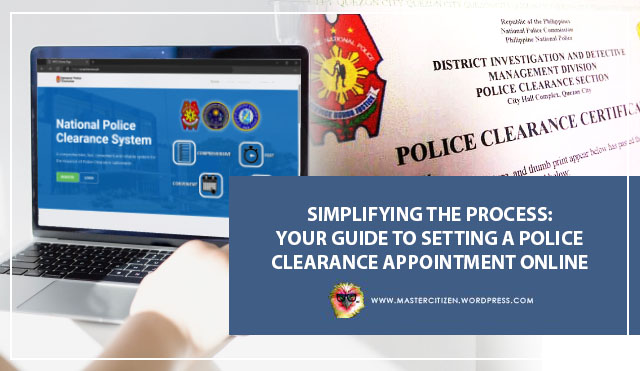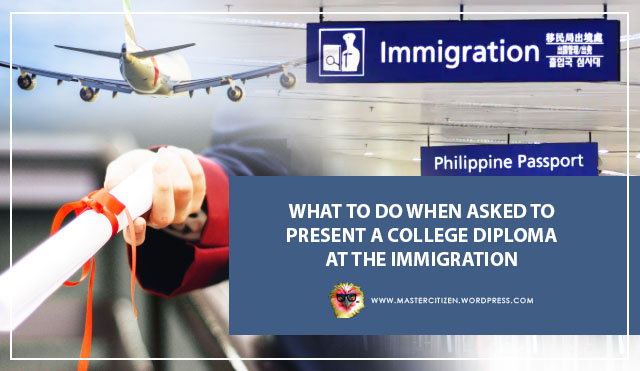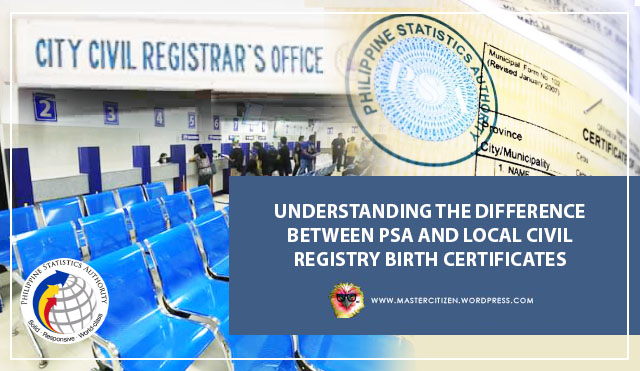Simplifying the Process: Your Guide to Setting a Police Clearance Appointment Online
Obtaining a police clearance is an essential step when you need to prove your good standing with the law, whether for employment, travel, or other purposes. The Philippine National Police (PNP) has streamlined the process by introducing an online application system for police clearances. This convenient approach saves time and reduces the hassle of long queues and paperwork. In this guide, we'll walk you through the steps on how to get a police clearance online from the PNP.
What is a Police Clearance?
A Police Clearance is an official document issued by the
Philippine National Police (PNP) or the local police department to certify that
an individual has no pending criminal cases or derogatory records in their
jurisdiction. It serves as a proof of a person's good standing with the law and
is often required for various purposes, such as employment, travel, or
obtaining certain permits and licenses.
Like the NBI clearance, the Police Clearance in the
Philippines has been simplified with the introduction of the National Police
Clearance System (NPCS), a centralized database managed by the Philippine
National Police (PNP). This system consolidates criminal records from various
localities into one accessible database, making it more convenient to check for
any criminal history. With this advancement, individuals no longer need to
choose between obtaining a police clearance based on their place of work or
residence, as their records are easily accessible at any police station.
Beyond employment purposes, a police clearance may also be
required when applying for the annual civil service exam, firearm registration,
credit card application, or various government-issued documents like birth
certificates.
Types of Police Clearances:
There are two types of police
clearances:
Local Police Clearance: This type of clearance is typically
issued by the local police station within your city or municipality. It is
commonly used for employment, business permits, and other local transactions.
If you are applying for a Local Police Clearance, there is no need to get an online
appointment.
National Police Clearance: The national police clearance is
issued by the Criminal Investigation and Detection Group (CIDG) of the
Philippine National Police. It is often required for purposes such as travel
abroad, visa applications, and certain government positions.
Step 1: Prepare the Required Documents
Before you begin the online application process, ensure you
have the necessary documents ready. These typically include:
Valid government-issued ID: You will need at least two valid
IDs, such as a passport, driver's license, or SSS ID; bring the original ID
during your appointment. If you only have one valid ID, bring a copy of your
PSA birth certificate. Again, bring the original copy and if applicable,
include the receipt to prove that you acquired it from a legitimate source
(direct from a PSA outlet or online at PSAHelpline.ph).
Proof of Address: Prepare a document that confirms your
current address, like a utility bill or barangay certificate.
Payment: Be ready to pay the processing fee, which may vary
depending on your location. It's a good idea to check the current fee on the
PNP's official website or contact your local police station for the exact
amount.
Step 2: Create an Online Account
To apply for a police clearance online, you need to create an account on the PNP's official website, PNP Clearance Application website:
If it is your first time to use the site, click on
the registration link and provide the necessary information, including your
full name, email address, and contact number. Create a secure password for your
account.
Step 3: Fill Out the Application Form
After successfully registering, log in to your account and
fill out the New Applicant Registration Form. Be sure to provide accurate
information. The form will typically ask for details such as your name,
birthdate, address, and contact information. Make sure to save all the
information you provided by clicking the Save button in the warning box that
will pop up at the end of the application process.
Step 4: Log in to Your Account
Using the email address and password you assigned for your
account during registration, login to your account to begin the online appointment
process.
Step 5: Fill out the Applicant Information Form
Please ensure that you complete all the necessary sections
in your Applicant Profile that remain unfilled,
If you are a Person with Disability (PWD), remember to check
the box that says "Please check if you are a PWD" and provide your
PWD ID number. If you are a recent graduate seeking your first job, mark the
checkbox that reads "Please check if you are a First Time Job Seeker"
in accordance with RA 11261 – the First Time Job Seeker Assistance Act. By
doing so, you can have the police clearance fee waived.
It's important to note that eligible applicants can only
avail of a free police clearance once. Review all the information you've
supplied to ensure its accurate and complete, as the printed police clearance
will reflect the details provided. Any inaccuracies or omissions will be
attributed to the applicant's responsibility, not the PNP's. Once you've
verified your information, click "Save Profile."
Step 6: Click the “Clearance Application” Button to Set an
Appointment
Once you've completed the application form, you'll need to
choose an appointment schedule to visit the police station for the clearance
process. Select a date and time that works for you, taking into consideration
the station's operating hours.
Step 5: Payment
Pay the processing fee for your police clearance online. The
payment options may vary, but you'll typically have choices like
over-the-counter payments at authorized banks or online payment platforms. Make
sure to keep the payment receipt as proof.
The fee for a police clearance is Php 150. You may pay at any of the following payment channels:
- Landbank of the Philippines ePayment portal
- 7-Eleven
- GCash
Step 6: Attend Your Appointment
On the scheduled date and time, visit the police station
with your required documents, including your valid ID, proof of address, and
payment receipt.
Step 7: Biometrics and Photo Capture
At the police station, you will undergo biometrics
(fingerprinting) and have your photo taken for the police clearance
certificate.
Step 9: Claim Your Police Clearance
Police clearances are released on the same day you applied
for it. No need to leave and come back for it. You may wait for it at the
station as it typically takes about 15 minutes for them to release it.
Expiration of Police Clearance:
Both local and national police clearances in the Philippines
have a validity period. Local
police clearances are usually valid for one year, while national police
clearances are valid for six months. It's important to note that these validity
periods may change, so it's advisable to check with the PNP or the issuing
authority for the most up-to-date information.
Difference Between Police Clearance and NBI Clearance:
While both police clearance and NBI (National Bureau of Investigation) clearance serve similar purposes of background checks, they are distinct in several ways:
a. Issuing Authority
Police Clearance is issued by the local police station or the CIDG (for national police clearance) under the Philippine National Police.
NBI Clarance is issued by the NBI, a separate government agency.
b. Scope of Check:
Police Clearance: Primarily focuses on your local or national criminal record within the jurisdiction of the Philippine National Police.
NBI Clearance: Provides a more comprehensive nationwide background check, including records from various law enforcement agencies, courts, and other government institutions.
c. Validity:
Police Clearance: Typically valid for a shorter period (local - one year, national - six months).
NBI Clearance: Usually valid for one year.
d. Purpose:
Police Clearance: often used for local transactions, employment, and some government-related matters.
NBI Clearance: Frequently required for international travel, visa applications, foreign employment, and certain legal processes.
e. Processing Locations:
Police Clearance: Obtained at the local police station or the CIDG office for national clearance.
NBI Clearance: Obtained at NBI Clearance Centers or authorized NBI satellite offices.
In the Philippines, obtaining a police clearance is a crucial step for various purposes. Understanding the two types of police clearances, their expiration periods, and the differences between police clearance and NBI clearance will help you determine which document you need for your specific requirements. As the procedures and regulations may change over time, always consult their official websites or contact the respective authorities for the latest information on obtaining these clearances.




Comments
Post a Comment